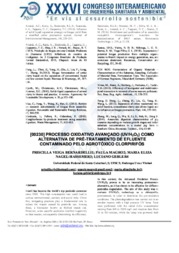Processo oxidativo avançado (UV/H2O2) como alternativa de pré-tratamento de efluente contaminado pelo agrotóxico clorpirifós.
Processo oxidativo avançado (UV/H2O2) como alternativa de pré-tratamento de efluente contaminado pelo agrotóxico clorpirifós.
Autoria: BERNARDELLI, P. V.; MAGRO, P.; NAGEL-HASSMER, M. E.; GEBLER, L.
Resumo: Brazil has become the world?s top pesticide consumer since 2008. This high consumption rate could lead to serious environmental, sanitary and social risks. Given this, mitigating practices play a fundamental role to reduce the impact caused by pesticide use. Among these, a bioreactor known as Biobed stands out. However, some specific pesticides interfere negatively on that reactor, consequently diminishing its efficiency. In this context, the Advanced Oxidation Process UV/H2O2 proves to be an interesting pretreatment alternative, as it has shown to be effective for different pesticides degradation. The aim of this study was to evaluate UV/H2O2 technology as a chlorpyrifos pretreatment, in order to determine the pre-oxidation conditions. The photodegradation was carried out in an annular reactor, with a high pressure UV lamp. Tests were performed with the initial H2O2 concentration varying from 600 to 2000 mg/L and reaction time from 15 to 80 minutes, while the lamp was powered both with 80 and 125W. The best result was obtained using 125W, H2O2 concentration of 1750 mg/L and 80 minutes of pre-oxidation, providing a 31.5% removal. These results show that UV/H2O2 technology is efficient as a pretreatment technique, resulting in a less concentrated and toxic effluent, so it could be further degraded by bioreactors. Palavras-chave: Pré-tratamento, UV/H2O2 , Biobed
Ano de publicação: 2018
Tipo de publicação: Artigo em anais e proceedings
Unidade: Embrapa Uva e Vinho
Palavras-chave: Biobed, Pré-tratamento, UV/H2O2
Observações
1 - Por padrão são exibidas publicações dos últimos 20 anos. Para encontrar publicações mais antigas, configure o filtro ano de publicação, colocando o ano a partir do qual você deseja encontrar publicações. O filtro está na coluna da esquerda na busca acima.
2 - Para ler algumas publicações da Embrapa (apenas as que estão em formato ePub), é necessário ter, no celular ou computador, um desses softwares gratuitos. Sistemas Android: Google Play Livros; IOS: iBooks; Windows e Linux: software Calibre.
Acesse outras publicações
Acesse a Base de Dados da Pesquisa Agropecuária (BDPA) para consultar o acervo completo das bibliotecas da Embrapa.

